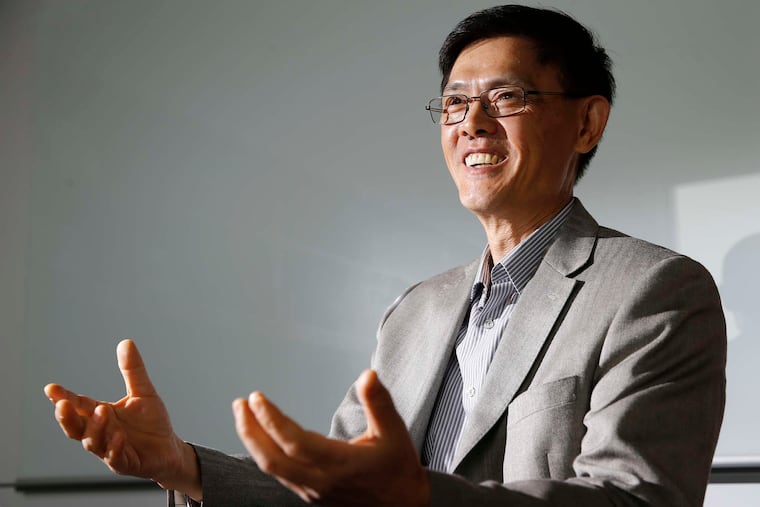Appellate court revives suit from Temple professor falsely accused of spying for China
"This is the first step in a long path to some semblance of justice for me, my family and the broader community of Chinese scientists," professor Xiaoxing Xi said.

A federal appellate court has revived a lawsuit from a Temple University professor who sued the U.S. government six years ago after he was falsely accused of being an economic spy for China.
In an opinion Wednesday, a three-judge panel for the U.S. Court of Appeals for the Third Circuit reversed a lower court decision dismissing claims from Xiaoxing Xi, 66, that the FBI had violated his constitutionally protected rights during an investigation that accused him of stealing schematics for a sophisticated piece of equipment known as a “pocket heater.”
That probe abruptly fell apart within months of Xi’s indictment after his attorneys proved the government had fundamentally misunderstood the technology at the heart of the case.
Though Xi sued the FBI in 2017, alleging investigators had knowingly ignored evidence that proved his innocence, a lower court judge dismissed the case, citing legal protections shielding government employees from many types of civil suits.
In their 37-page ruling Wednesday, the Third Circuit judges disagreed with that decision.
They maintained that while those protections give investigators wide latitude to conduct their work without second guessing by the courts, it did not give them free rein to investigate, search, and prosecute people without probable cause.
Writing for the panel, Circuit Judge Cheryl Ann Krause concluded the professor had laid out several concrete claims that agents had willfully ignored or recklessly disregarded evidence that would have cleared Xi of suspicion. Still, she stressed that the court was basing its decision solely on Xi’s allegations — ones that he will have to back up with evidence should his case go to trial.
She was joined in the decision by Circuit Judges Marjorie Rendell and Stephanos Bibas.
“We are pleased that the court has affirmed the basic principle of justice: that no government agent has the discretion to violate the Constitution,” said David Rudovsky, a Philadelphia civil rights lawyer who is representing Xi along with the ACLU. “We are heartened by the fact that Professor Xi can seek damages for the reckless misconduct that caused so much pain and suffering for his family.”
In his suit, Xi — a naturalized U.S. citizen and world-renowned expert in the field of superconductivity — contends that well before he was indicted on wire fraud charges, experts informed FBI Special Agent Andrew Haugen, a counterintelligence investigator who led the probe, that he had misinterpreted the technology at the heart of the charges.
The inventor of the “pocket heater,” whose schematics Xi was accused of stealing, told investigators the device was not as revolutionary as they believed and that the blueprints Xi had shared with China were for a different device entirely.
As for Xi’s e-mails with colleagues in China, Rudovsky insisted they weren’t nefarious and likened them to the type of international collaboration among academics that goes on every day.
He has alleged through Xi’s lawsuit that Haugen willfully ignored those facts in order to secure an indictment.
The government maintains the evidence of Xi’s innocence wasn’t so cut-and-dried during the investigation, that Haugen made honest mistakes and that prosecutors have already acknowledged them by dropping the charges.
Either way, the consequences for Xi were as swift as they were severe.
Armed agents arrested him in front of his family during a 2015 raid at his Penn Valley home.
Two days before he was charged, Xi has said he was offered the opportunity to lead Temple’s physics department. By the time the charges were dropped and he was permitted to return to campus, the position had been filled by a colleague. (University officials have disputed that plans for Xi’s chairmanship were ever concrete.)
Even today, the professor maintains his physics research at Temple has been affected by his brush with the justice system.
He once led a bustling lab filled with assistants and funded by multiple government grants. Now, Xi said he only has one other person working with him and has limited himself to one government grant at a time out of concern that his work might draw federal scrutiny again.
Xi also alleged in his suit that the FBI’s case was driven by ethnic bias — part of a series of Justice Department cases targeting Chinese-born scientists in the U.S. that critics have likened to red scares of the Cold War.
But in its ruling Wednesday, the Third Circuit agreed with the lower court that dismissed that part of his suit, finding that Xi had failed to specifically detail those allegations.
Xi ”does not allege that Haugen harbored personal animus against the Chinese,” Krause wrote, adding later that the mere possibility that Haugen may also have had a discriminatory motive “is insufficient.”
The case will now return to district court for further proceedings on Xi’s constitutional claims. U.S. District Judge R. Barclay Surrick has not yet set a date for a hearing.
Still, Xi said Wednesday that he viewed the Third Circuit’s ruling as a victory for him.
“This is the first step in a long path to some semblance of justice for me, my family and the broader community of Chinese scientists and scientists of Chinese descent who have been falsely accused of spying because of where we were born,” he said.